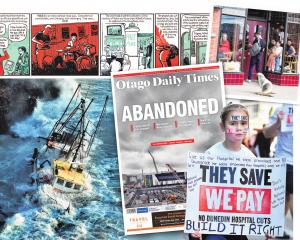Battle lines are emerging as Dunedin city councillors prepare to consider another step towards the pedestrianisation of parts of the city.
Councillors will today consider a staff report with recommendations that, if approved, will take the city another step closer to trialling the closure of the lower Octagon and lower Stuart St to vehicles.
But councillors spoken to by the Otago Daily Times appeared divided over the moves already afoot, which
included early work that could lead to pedestrianisation in other parts of the city.
Dunedin Mayor Dave Cull said the work was not aimed specifically at pedestrianising more of the city, but rather to reconsider the existing transport ''balance'' in its main streets.
That balance favoured cars at present, but could be tweaked to introduce new solutions to make pedestrians safer.
That could lead to more pedestrian-only zones, but alternatively to more shared spaces, lower vehicle speed limits or the reintroduction of Barnes Dance crossings, for example, he said.
''It's a matter of saying how do we best serve the people who want to use this area at any particular time of the day?''Cr John Bezett favoured making it easier for pedestrians, but worried the council was rushing into the lower Octagon trial when more information was needed ''before we even entertain the idea''.
Cr Andrew Whiley was hearing ''rumblings'' about the proposed trial, and worried the council was taking a ''piecemeal'' approach to projects, like cycleways, without an overall vision.
Cr Doug Hall said he could be ''swayed either way'', but for now remained unconvinced.
''I haven't got time to walk around the CBD. If I can't park close by, I won't be going, and I know a lot of people that feel the same way.''
Cr Hilary Calvert questioned whether pedestrian-only zones would work in Dunedin, and believed the council should focus on reviewing the entire Octagon's future use.
However, other councillors expressed support, including Cr David Benson-Pope, who said one of Dunedin's greatest strengths - its ''human scale'' - needed to be enhanced.
''I think we need to keep moving to improve the physical environment for locals and visitors alike, and that includes future inner-city pedestrianisation, in whatever form,'' he said.
Cr Richard Thomson supported the trial, but cautioned it would be hard to judge the extra vibrancy a permanent change
- with associated improvements - would create from the trial's results.
The council would also need to be ''hellishly careful'' to make any change the right one, or risk a significant public backlash, he believed.
Cr Kate Wilson supported the concept of pedestrian-friendly areas, saying results overseas were ''impressive'', but the devil would be in the detail.
''It comes down to the detail and how seamlessly we can manage to do these things, and trialling them and getting people on board.''
Cr Andrew Noone also favoured a cautious approach, but believed ''there's no doubt'' pedestrianisation worked in other centres.
Cr Mike Lord said he was ''not against things like that'', but would not vote for any change that was not supported by a majority of affected businesses.
''There's a lot of places around the world where people have made those changes, and there's no reason it couldn't happen here.''
Cr Lee Vandervis said the proposed trial ''seems to be driven currently by an uncomfortable mix of Octagon pub managers and greenie car un-enthusiasts''.
''Until we get some better information about exactly what is proposed, its wider implications and who wants it, I can see little benefit and significant cost arising from the current proposal.''
Deputy mayor Chris Staynes and Crs Jinty MacTavish, Neville Peat and Aaron Hawkins could not be contacted.












